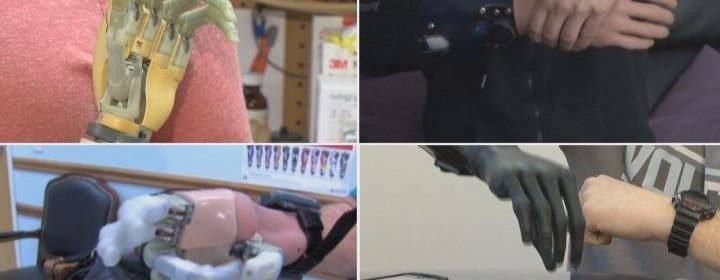5 fantastic health innovations from Edmonton in 2018

From lab-grown human tissue, to a simple case for life-saving pills, Edmonton brains came up with some pretty cool stuff in 2018.
One of my favourite parts of being the health reporter for Global Edmonton is the backstage pass to mind-blowing medical research in our city. Narrowing it all down to a few of the most innovative technologies or treatments every year is never easy, but here are my picks for 2018.
1. Donor lung assessment tool
Related
Edmonton health matters: Lungs in a box, musical Movember
Alberta research aims to create safer form of cartilage for nasal reconstructions
 Canadian first: New technology in Calgary will better detect prostate cancer
Canadian first: New technology in Calgary will better detect prostate cancer
In the past five years, the University of Alberta Hospital’s transplant team managed to increase the number of lung transplants from 30 per year to over 70. That’s thanks to their ex vivo perfusion technology, which allows them to store donor lungs outside of the body while they treat or repair the organs. It means previously unusable lungs could be transplanted — and the process became even more effective in 2018. Two doctors, Jayan Nagendran and Benjamin Adam, developed an assessment tool to measure the exact amount of injury in donor lungs and treat them accordingly, optimizing the organs’ health for their new person.
2. Sensation in missing limbs
We’ve seen some incredibly sophisticated bionic limbs over the years, but one thing they’re all missing is feeling. Dr. Jackie Hebert’s team partnered with researchers from the Cleveland Clinic to figure out a way for a person with no hand to sense complex hand movements. That involved surgically rewiring the nerves of six patients and using tiny robots to vibrate the muscles. It resulted in patients using their prosthetic limbs up to 300 times better than before — because they didn’t have to watch every move.
3. Lab-grown nose cartilage
Right now, if you needed your nose reconstructed, surgeons would move cartilage from your ears or ribs to the middle of your face. That would require several surgeries and a potentially long recovery period. But three Edmonton doctors — Adetola Adesida, Kal Ansari and Martin Osswald — developed a way to grow nasal cartilage in a lab. They take a tiny biopsy and seed the cells on a collagen scaffold, sprouting an unlimited supply of cartilage from the patients’ own cells.
4. Prostate cancer blood test
Dr. John Lewis’ U of A team has been developing Clarity DX for years. In 2018, it finally progressed to widespread testing across Alberta. The simple blood test is 40 per cent more accurate than the standard PSA test, and can predict which men need a biopsy and which can safely avoid the painful procedure.
5. SMHeartCard
Aspirin and nitroglycerin are standard emergency medications for patients with heart attack symptoms, yet a U of A study shows only 20 per cent of heart disease patients carry nitroglycerin. Part of the problem is that it often comes in a glass bottle. That’s why doctors John Mackey and Neal Davies, along with retired engineer James Stewart, invented the SMHeartCard, a compact plastic container that protects the pills and fits easily into a wallet, purse or pocket.
If I’ve missed any of your favourite #yeg health innovations, or if you have any health story ideas for 2019, please email me: [email protected]
Source: Read Full Article
